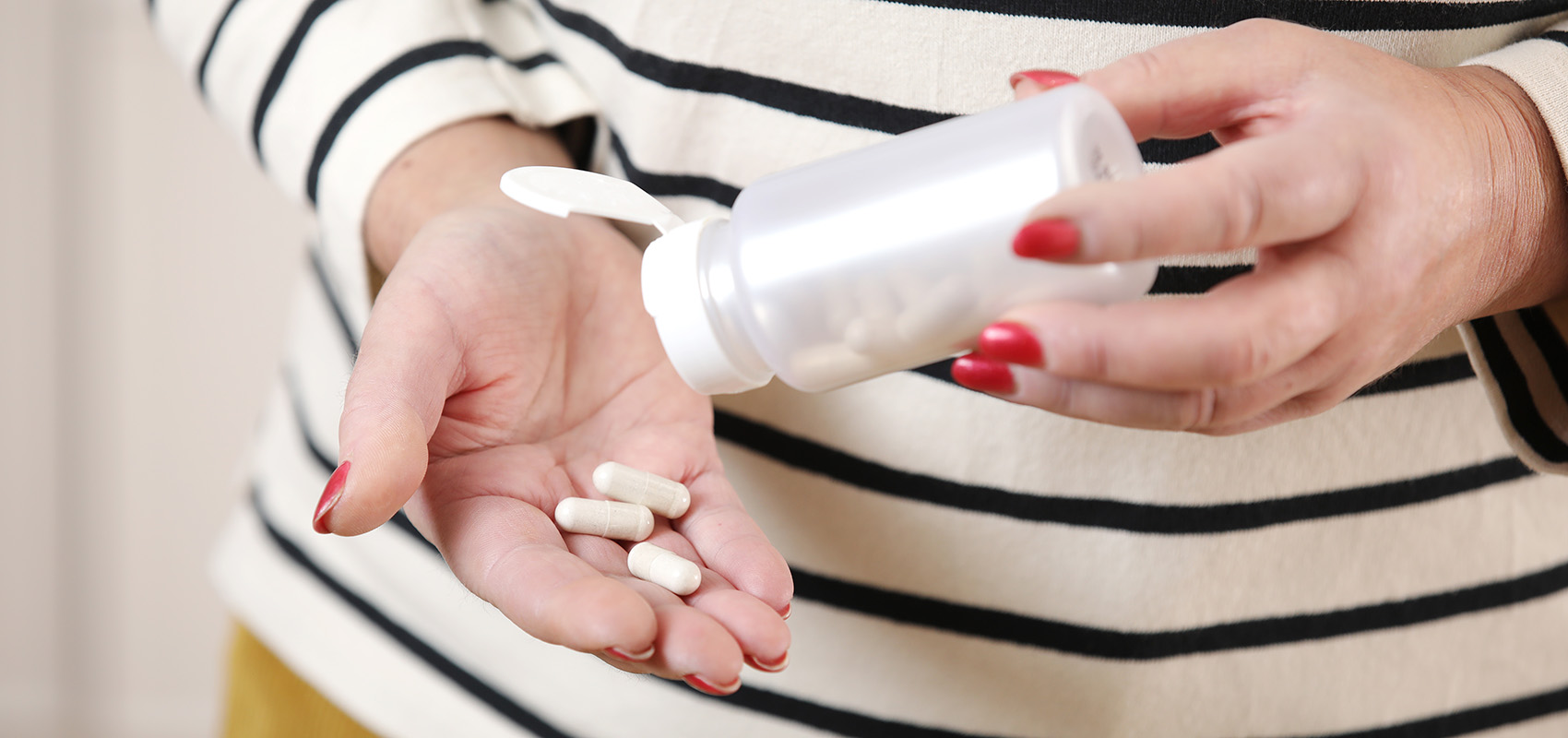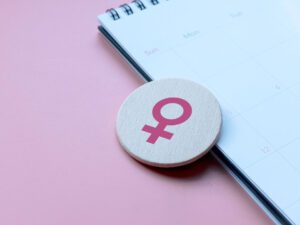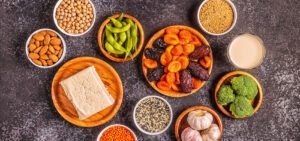Introduction
Menopause is a significant transition period in a woman’s life that often brings about changes in hormone levels, metabolism, and overall health. While it is a natural process, it can cause various symptoms that can affect a woman’s quality of life. One of the most common challenges during menopause is weight gain and a shift in body composition.
During menopause, there is a decline in estrogen levels which can trigger an increase or unmarked amount of cortisol. Cortisol at a higher level can then upset the balance for sleep (and the release of some crucial hormones responsible for helping with hunger) & also trigger more fat storage hormones.
Also, the natural aging effect of less estrogen resulting in a decrease in muscle mass & density, resulting in a slower metabolism and increased fat storage, particularly around the abdominal area, leading to “stubborn fat” or visceral fat – the one that increases risks to heart disease,[1] type 2 diabetes & other degenerative diseases.
To help manage weight during menopause and more importantly – the 10 years prior to menopause (peri-menopause, where symptoms of changing hormones start appearing), it’s important to come up with and maintain a healthy menopause diet plan that is rich in nutrient-dense foods and low in added sugars and unhealthy fats. Incorporating physical activity into your routine, particularly strength training[2], can help to increase muscle mass and metabolism & lead to less severe menopausal symptoms. Managing stress is critical also, in aiding weight loss as it links to the changing relationship with cortisol and estrogen, leaving stress levels higher within the body at this time in life and is a step that is quite often overlooked.
The Quick Fix — What to Eat and What Not to Eat
Calories in v calories out is an outdated model, however because of slowing metabolism, it is essential to look at quantity or volume of food in a total day when making a menopause diet plan.
Choose nutrient-dense foods: Nutrient-dense foods are those that provide a high amount of nutrients, such as vitamins, minerals, and antioxidants, in proportion to their calorie content. These foods include fruits, vegetables, whole grains, lean protein, and healthy fats. Aim to include a variety of these foods in your diet plan to ensure that you are getting all the necessary nutrients.
Equally, avoid processed foods (anything in a packet), too many stimulants (as it raises cortisol levels, which can impact sleep negatively & increase fat storage), foods that are toxic to the body eg. alcohol, sugar, over the counter medications (anti-inflammatories, sinus/hayfever meds, pain relief – NB reduce these where possible & look for natural alternatives for everyday management).
Foods to avoid
refined sugars, artificial Trans Fats (Partially Hydrogenated Oil) eg canola oil, Too Many Omega-6 Fatty Acids, Refined Carbohydrates like white pasta, white rice, white bread, Processed Meat eg. mince meat, luncheon meats, Saturated Fat, Gluten (many women become sensitive to gluten as the gut’s pH changes with oestrogen changes), Dairy (again, the proteins in whole milk may be less tolerated at this phase of life giving many women bloating, flatulance & gut disturbances), and high salt snacks. Avoid sugary drinks. Anything with more than 5 ingredients on the packet is a warning sign to avoid these foods in your menopause diet plan.
Foods to Include
Start with whole foods, lots of berries and greens, as a guide. Nuts, Broccoli, Pumpkin seeds, Blueberries, Cranberries, grapes, grapefruit, Green Tea, a little bit of coffee, Beets, Brussels sprouts, cabbage, kale, cauliflower, Dark chocolate if you feel like a treat. Dark Leafy greens, asparagus, olives, and whole grains, Kombucha, fermented foods, bone broth, lemon juice & hot water, fatty fish like salmon, olive oil, lean protein such as organic chicken breast and organic lean red meat.
Include plants and herbs called adaptogens and phytoestrogens – these mimic the effects of estrogen in the body.
Phytoestrogen-rich foods, such as soy (non GMO), flaxseed, lentils, prunes, peaches, strawberries, raspberries, watermelon, garlic, winter squash, green beans & collards. can help reduce hot flashes and other symptoms and help reduce their intensity.
Adaptogens are medicinal or therapeutic plants that increase your body’s resistance to stress. They do so by controlling your reaction to stress and regulating various body functions, such as digestion, mood, temperature control, and immunity therefore making them very effective with hot flushes, sleep, fatigue, cognition, anxiety and weight gain and have been used in Ayurvedic and Chinese medicine for centuries.
Adaptogens like Maca, Ashwaghanda, Schisandra, Rhodiaola, & some mushroom varieties (like Lion’s Mane) can be useful and are a great addition to smoothies.* A word of caution – less is best & introduce one adaptogen at a time (as you may only need one – the compounding effect doesn’t not always equal “better”) And they’re not all safe for everybody. Women, as they are more likely to have thyroid disease than men, need to be especially aware of potential contraindications when they start using adaptogens.**
Prioritise hydration: Dehydration can exacerbate menopause symptoms, such as hot flashes and dry skin. Therefore, it’s important to stay hydrated by drinking plenty of water and other fluids throughout the day. Opt for water, herbal teas, and low-sugar beverages.
Equally important is to eat in a relaxed state. It may be beneficial to “tap into” the part of the nervous system that works on “digestion” ie. the opposite to fight or flight mechanism (which would have you shut down the digestive area, resulting long term to difficulties in digesting food). You will know if this is happening if you feel bloated after a meal, get reflux or heartburn and are putting on weight around the middle.
*Adaptogens – here’s a link to more info on adaptogenic herbs for menopausal symptoms by Sports pHD Dr Stacy Sims
**My favourite “little yellow pill” containing adaptogens, as well as reducing inflammation – one of the KEY instigators in troubling symptoms persisting (adaptogens are also a great preventative against many linked degenerative diseases)

Supplements You Can Incorporate into a Full Menopause Diet Plan
L-carnitine
L-carnitine is an amino acid that can help with fat loss and improve energy levels. The pathway by which this works is through transporting fatty acids to the mitochondria, where the energy is then used as energy. In reality, this means that over a period of time, while in an energy deficit, your body is going to be able to use more stored fat as energy. This helps you become leaner.
Omega-3s
Increasing insulin sensitivity is one of the most important things when aiming to lose fat. Omega-3s have the potential to help with this. The wall that surrounds the cell is where nutrients pass through. The permeability of the substance within the cell wall can change depending on variables, including diet. To maximize insulin sensitivity, you want the cell wall to be as “fluid” as possible, increasing cell permeability. Omega-3s are very good at achieving this.
Green Powders
Green powders can indirectly help with fat loss in many ways, including:
- Reducing cravings due to improved sugar management because of the fibre content.
- Increasing insulin sensitivity by adding extra fibre to your diet.
- Helping the body metabolise estrogen more efficiently.
Along with these key benefits, greens powders help improve digestion, which reduces bloating within the gut. They also help improve nutrient uptake, so recovery and overall energy levels tend to improve & help the liver to detoxify more efficiently, meaning you don’t feel so sluggish and also ultimately MAKE more energy!
Green powders typically include greens like – spirulina, wheatgrass, barley grass, chlorella… all of which contain many essential minerals your liver needs to do its job properly. Make sure you go for the organic option. Cost is negligible but results will be massive!
BCAAs
BCAAs aren’t directly a fat-loss supplement, but what you need to remember is that to optimise fat loss, you need to retain as much metabolically active tissue (i.e., muscle) as possible. They will help sustain muscle protein synthesis and reduce the effects of catabolism.
A good Multi which includes Vitamin B12 – this helps with a lot of liver detox and energy making. It’s also good to note that in times of stress (& remember your body is under stress when it has ups & downs of hormones), your body uses more Vitamin B to rebalance the nervous system – here’s my favourite combo
Calcium & Magnesium – these two nutrients get depleted quickly as we get older, and help you stay calm & relaxed — plus stop muscle cramping, twitches, and improve bone health. This also ensures you get a deep night’s sleep for complete regeneration!
Zinc – helps with healing skin cuts & bruising, increases repair mechanisms – so think “thinning, dry or itchy skin”. Acne or scarring.
A good combination for night time nutrients with the above in 2 small tablets can be found here
Vitamin D – is more of an enzyme or catalyst to help make other vitamins and minerals work better in the places they are most needed. This vitamin also helps with moods & bones.
Protandim NRF2 – this is a herbal tablet of 5 natural ingredients (mostly adaptogens) that help the body with reducing oxidative stress (think inflammation) which is at the root cause of most of your symptoms. Sometimes this is the ONLY change needed to help relieve symptoms and get your body back on track.
Protandim NRF1 – this works on your cells “energy production” & supports detoxing. Basically it’s like having your car run on all 4 cylinders again after only having 3 working & the wrong oil in. This helps every cell in your body have better quality energy – giving you a zing in your step again!
NAD – this combination of natural ingredients helps support collagen, alongside healthy cholesterol, healthy metabolism & is great for what’s called “healthy longevity” or put simply “quality of life.” In menopause, this can be really important if you have a family history of certain conditions that impact the brain, heart or gut.
Collagen supplements – these work — but again you normally get what you pay for, so look into the quality of what you’re buying. Best ones I have found are hydrolysed marine peptides – 5-10mg per serve & check it’s ethically sourced, no toxicity & a “clean” product. Remember, a toxic load creates prolonged & more severe symptoms. Here’s my favourite one based on clinical results of collagen density increasing by more 42% over 8 weeks.
Quality protein powder – women fare better with whey protein (if your tummy can tolerate it and is not sensitive). This has a better conversion to muscle ratio.
Any More Tips?
REMEMBER THE HIDDEN SECRET TO BREATHE – REST, DIGEST, REPAIR
Your Pre-Menopausal Life Partially Informs your Menopausal Experience
Your genes and lifestyle can impact what and how severe your symptoms are, as well as how aware you are of your body. Some of this is self education and awareness and some are simply better choices.
While there’s nothing you can do for some genetic conditions, it is now thought that our genes are also conditioned by lifestyle choices over generations — which means it’s not too late to positively impact those lifestyle choices and habits to lessen the number and intensity of symptoms.
Nutrigenomics is a growing industry that uses nutrients or natural compounds to “switch back on positive gene adaptive pathways” that help you heal.
Also available on my online socials – where I talk about this in my stories a lot.
Sticking to Your Menopause Diet Plan, Getting Results, and Adjusting the Plan Based on Those Results
If you’ve ever tried to follow a diet alone without accountability or having to check in, you may have found it going “wayward” at times… that’s why working with someone who can mentor and guide you (and to help you with YOUR specific lifestyle along the way) is well worth the investment. Most of my clients how are serious about preparing themselves for peri-menopausal changes (or who have tried everything and don’t want to go down the “HRT/MRT” route for personal reasons) find that my course offers both education, the why, the how & the support along the way to get the results, while also connecting with the deeper meaning of food, emotions and how to support themselves and make the right choices for THEM.
My 6 week online course covers nutrition, what works best for stress, gut health, skin health, inner growth and dealing with changes lifestyle plus the pressures of work.
The transformation can be remarkable is just a few short weeks, which of course last a lifetime. This is the next phase of your life. Quite a lot changes, both positive and challenging. Its great to have someone who has your back.
Here’s more details if this resonates with you.
1Study of visceral fat & heart disease – here
2Article with links to belly fat & strength training – here





